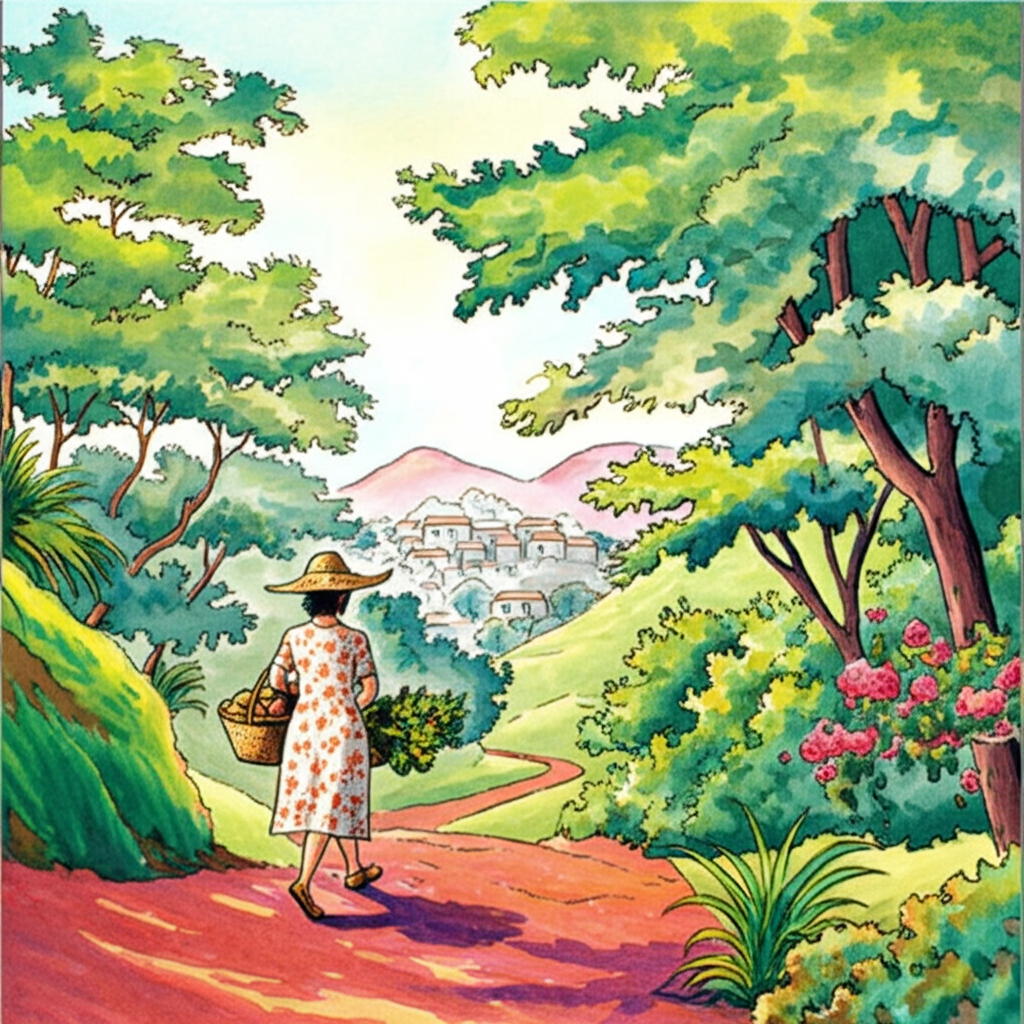
The Oaks, Holly Mount, The Parsonage, The Pines, Dumbarnie, Mackinnon’s Hall, and Windermere. These are the names of some old houses that are still around near a big town in the Indian hills. They were built a long, long time ago by British people who wanted to get away from the super hot weather down below. Some of the houses got old and broken, and now wild animals like cats, owls, goats, and sometimes people who lead mules live in them. But some are still in good shape.
Among these old houses is a cute, white cottage called Mulberry Lodge. And in it lived a sweet, older British lady named Miss Mackenzie. She was lively and wore dresses that were old-fashioned but looked nice. Once a week, she walked to town and bought yummy things like butter, jam, soap, and sometimes a bottle of perfume.
Miss Mackenzie had lived there since she was a teenager, even before the big war. Her parents, brother, and sister had all passed away. She didn’t have any family in India, and she lived on a little money and gifts from a friend she had known since she was a kid. She didn’t get many visitors – just the local priest, the mailman, and the milkman. Like other lonely older people, she had a pet, a big black cat with bright, yellow eyes.
In her small garden, she grew pretty flowers like dahlias, chrysanthemums, gladioli, and some special orchids. She knew a lot about wildflowers, trees, birds, and bugs. She didn’t study them in school, but she just knew a lot about all the things that grew around her.
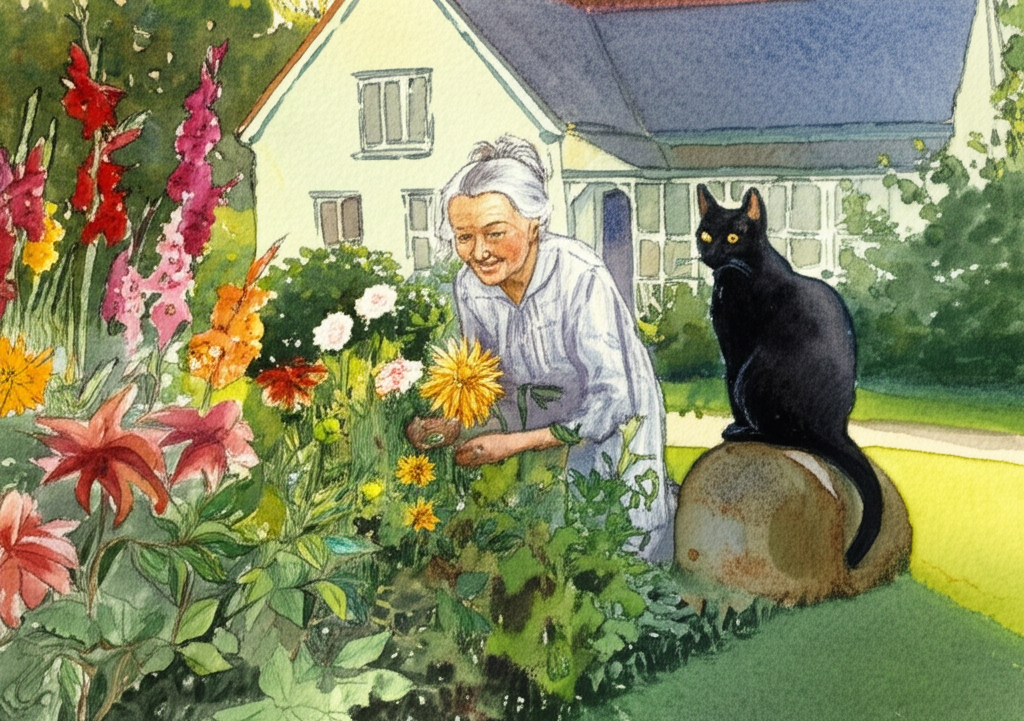
It was September, and the rainy season was almost over. Miss Mackenzie’s orange marigolds were blooming. She hoped the winter wouldn’t be too cold because it was getting harder for her to handle the cold. One day, while she was working in her garden, she saw a boy from school picking wildflowers on the hill above her cottage. ‘What are you doing, young man?’ she called out.
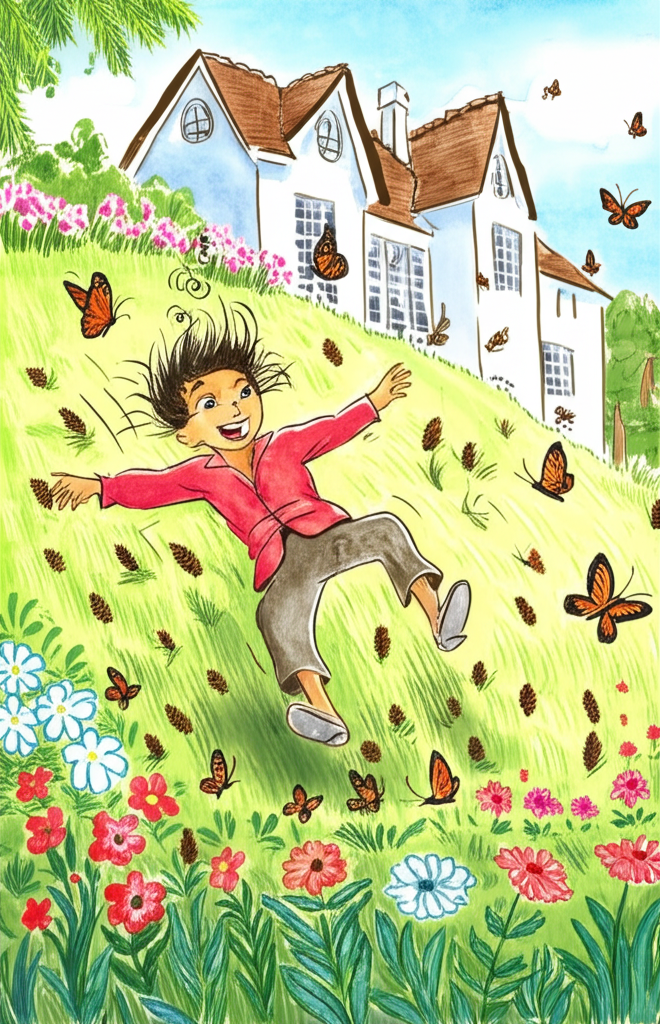
The boy got scared and tried to run up the hill, but he slipped on pine needles and slid down into Miss Mackenzie’s flower bed. He couldn’t get away, so he gave her a big smile and said, ‘Good morning, Miss.’
‘Good morning,’ said Miss Mackenzie in a serious voice. ‘Would you please get out of my flower bed?’
The boy carefully stepped over the flowers and looked at Miss Mackenzie with big, innocent eyes.
‘You should be at school,’ she said. ‘What are you doing here?’
‘Picking flowers, Miss.’ He showed her a bunch of ferns and wildflowers.
‘Oh,’ Miss Mackenzie felt a little softer. It had been a long time since she had seen a boy who liked flowers.
‘Do you like flowers?’ she asked.
‘Yes, Miss. I want to be a botan…a botanist.’
‘You mean a botanist?’
‘Yes, Miss.’
‘That’s interesting. Do you know the names of these flowers?’
‘This is a buttercup,’ he said, showing her a little yellow flower. ‘But I don’t know what this is,’ he said, holding up a light pink flower with a heart-shaped leaf.
‘It’s a wild begonia,’ said Miss Mackenzie. ‘And that purple stuff is salvia. Do you have any books about flowers?’
‘No, Miss.’
‘Come inside, and I’ll show you one.’
She took the boy into a small living room that was full of furniture, books, vases, and jars. He sat nervously on the edge of a chair. The cat jumped right onto his lap and started purring softly.
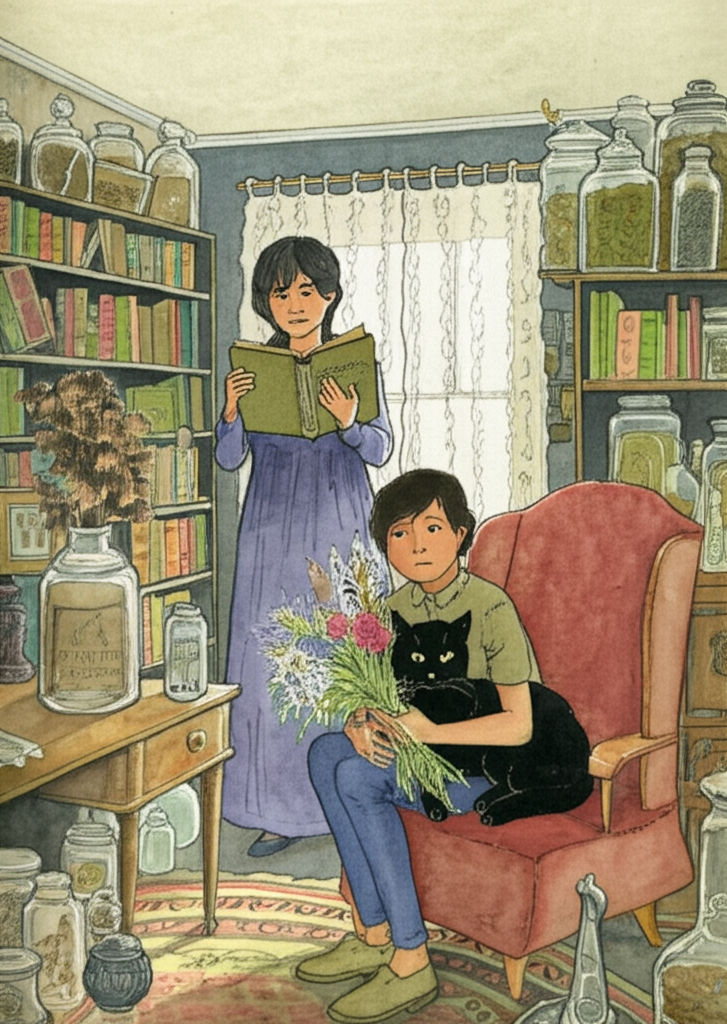
‘What’s your name?’ asked Miss Mackenzie, as she looked through her books.
‘Anil, Miss.’
‘And where do you live?’
‘When school is out, I go to Delhi. My dad has a store there.’
‘Oh, and what does he sell?’
‘Light bulbs, Miss.’
‘Flower bulbs?’
‘No, electric light bulbs.’
‘Ah, here it is!’ she said, taking a big book from the shelf. ‘ Flora Himaliensis , made in 1892, and maybe the only one in India. This is a special book, Anil. No other scientist has written about as many wildflowers from the mountains. But there are still lots of plants that scientists don’t know about because they spend too much time looking through microscopes instead of going into the mountains. Maybe you’ll do something about that someday.’
‘Yes, Miss.’
She turned on the stove and put the kettle on to make tea. And then the old British lady and the small Indian boy sat next to each other, reading the book. Miss Mackenzie showed him lots of flowers that grew near the town, and the boy wrote down their names and when they bloom.
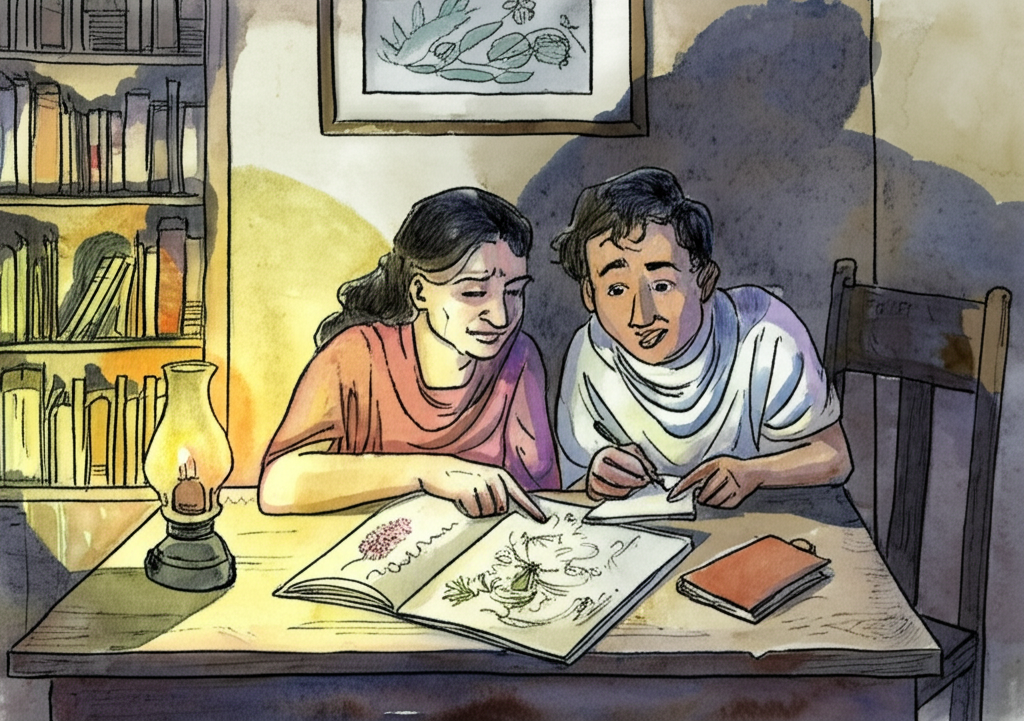
‘Can I come again?’ asked Anil, when it was time to leave.
‘If you want to,’ said Miss Mackenzie. ‘But not during school. You need to go to your classes.’
After that, Anil visited Miss Mackenzie about once a week, and he almost always brought a wildflower for her to name. She looked forward to the boy’s visits. Sometimes if more than a week went by and he didn’t come, she would complain to the cat.
By the middle of October, with only two weeks left before school ended, snow fell on the mountains far away. One mountain was taller than the others, a white point against the blue sky. When the sun went down, the point turned from orange to pink to red.
‘How tall is that mountain?’ asked Anil.
‘It must be over 15,000 feet,’ said Miss Mackenzie. ‘I always wanted to go there, but there isn’t a good road. On the lower hills, there are flowers that you don’t see here: blue gentians, purple columbines.’
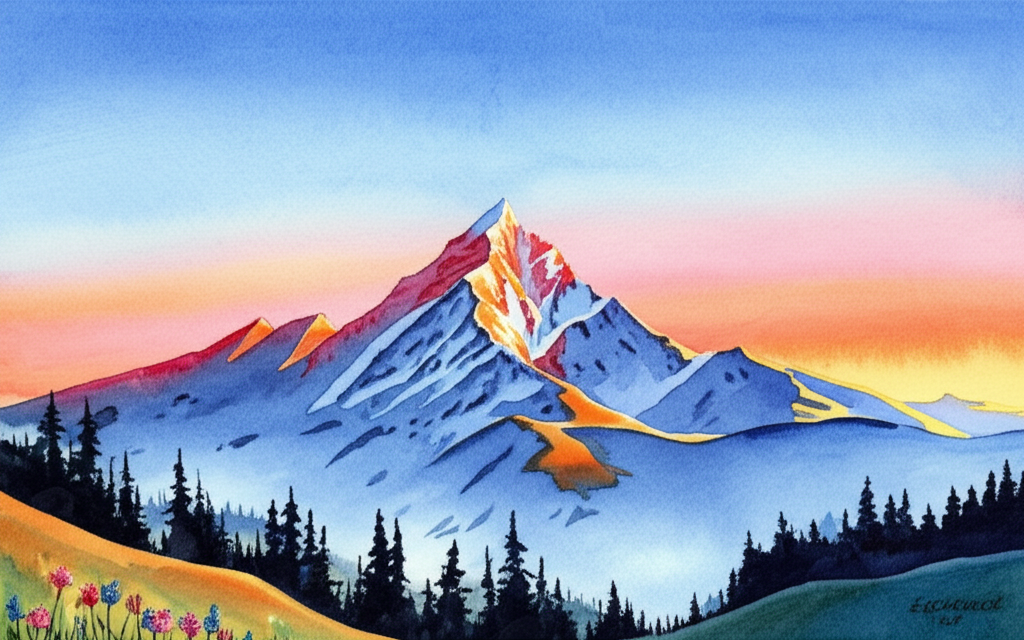
The day before school closed, Anil came to say goodbye. As he was about to leave, Miss Mackenzie pushed the Flora Himaliensis into his hands. ‘It’s a gift,’ she said.
‘But I’ll be back next year, and I can look at it then,’ he said. ‘Plus, it’s so valuable!’
‘That’s why I’m giving it to you. Otherwise, it will end up with people who sell junk.’
‘But, Miss…’
‘Don’t argue.’
The boy held the book under his arm, stood up straight, and said, ‘Goodbye, Miss Mackenzie.’ It was the first time he had said her name.
Strong winds soon brought rain and icy rain, killing the flowers in the garden. The cat stayed inside, curled up at the end of the bed. Miss Mackenzie wrapped herself in old blankets and scarves, but she still felt cold. Her fingers got so stiff that it took almost an hour to open a can of beans.
Then it snowed, and for several days, the milkman didn’t come.
Tired, she spent most of her time in bed. It was the warmest place. She kept a hot water bottle against her back, and the cat kept her feet warm. She dreamed of spring and summer. In three months, the primroses would be blooming, and Anil would come back.
One night, the hot water bottle broke, making the bed wet. The sun didn’t shine for several days, and the blankets stayed wet. Miss Mackenzie caught a cold and had to stay in her cold, uncomfortable bed.
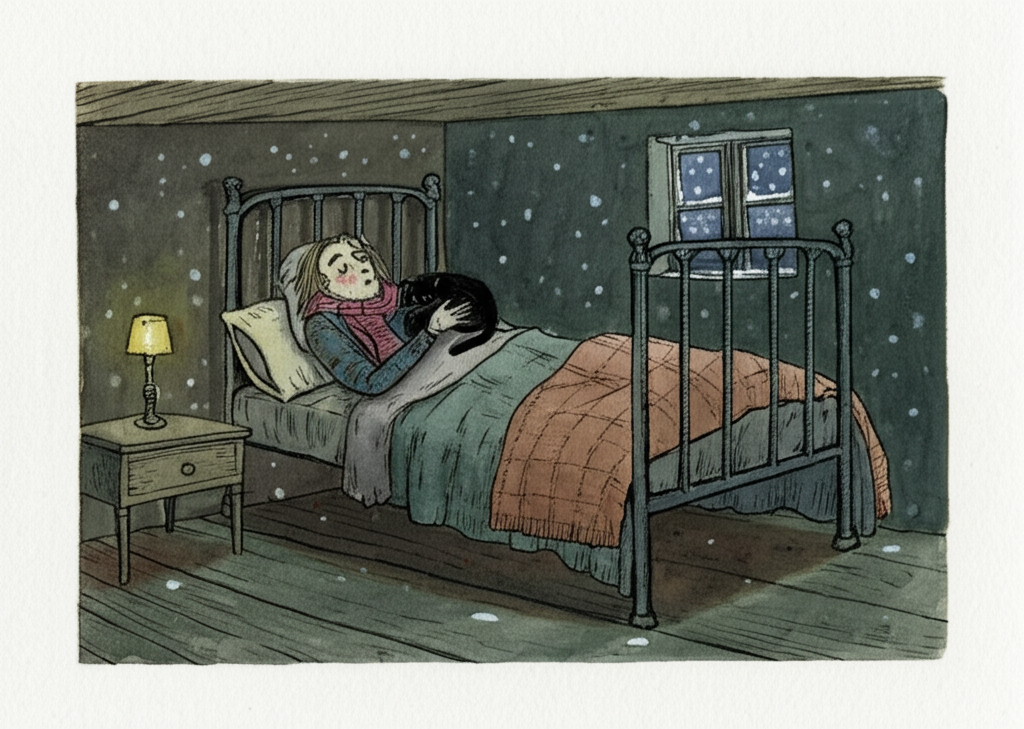
A strong wind started one night and blew the bedroom window open. Miss Mackenzie was too weak to get up and close it. The wind blew rain and icy rain into the room. The cat snuggled close to its owner. In the morning, the body wasn’t warm anymore, and the cat left the bed and started scratching on the floor.
As sunlight came through the window, the milkman arrived. He poured some milk into the saucer on the doorstep, and the cat jumped down from the window. The milkman called out to Miss Mackenzie. But no one answered.
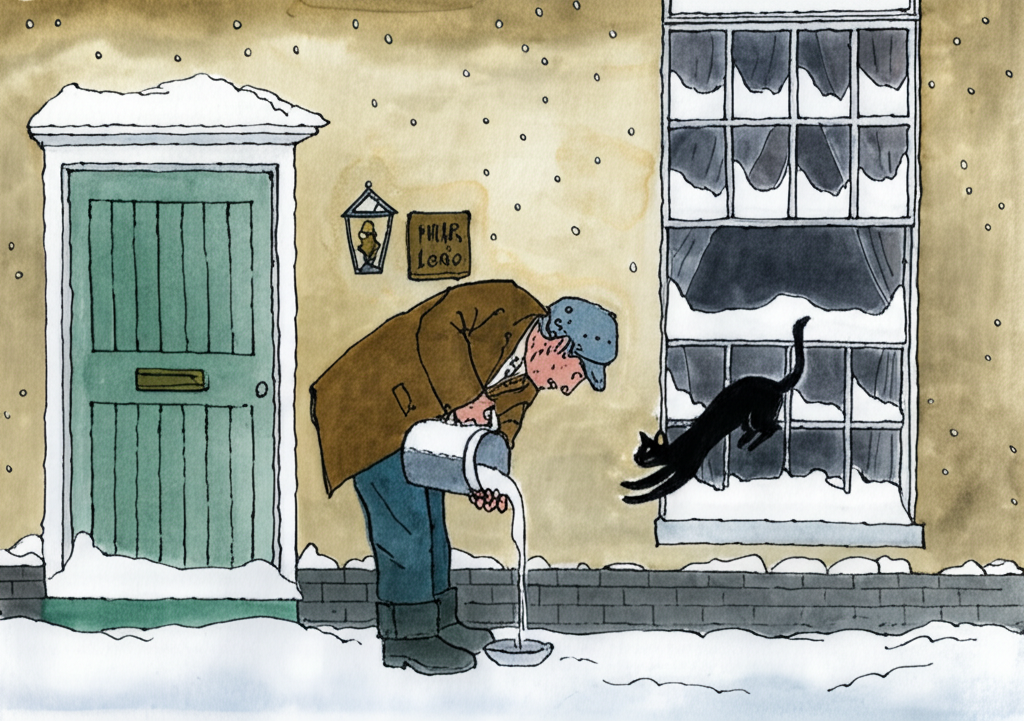
He knew she was always awake before sunrise, so he looked through the open window and called again.
Miss Mackenzie didn’t answer. She had gone to the mountain, where the blue gentians and purple columbines grow.